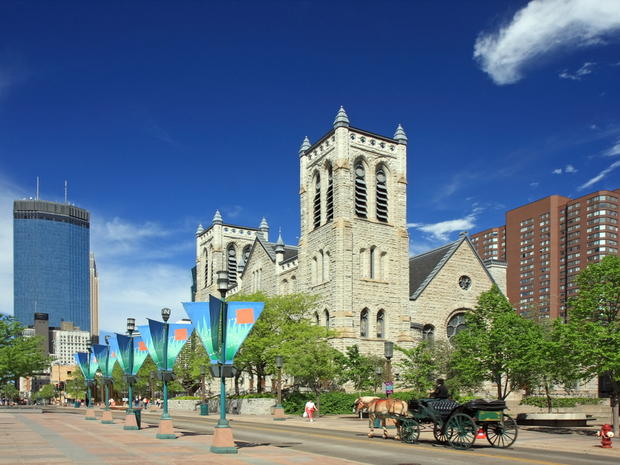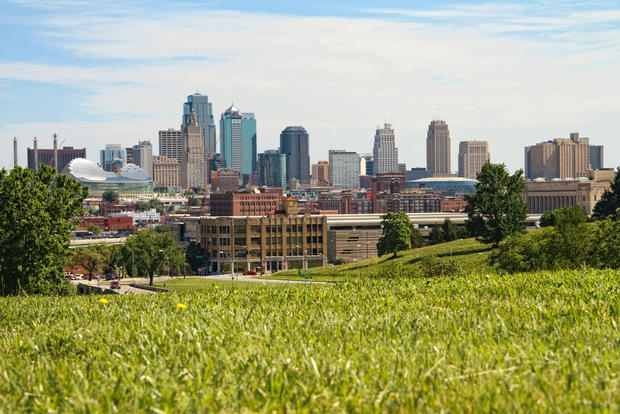Top 10 cities for college grads
(MoneyWatch) College graduation is exciting. The world is at your fingertips, and you have a chance to pursue the career of your dreams -- in any city you want. If you've always dreamed about living in New York or Los Angeles, now's the time to make it happen.
But what if you're not sure where you want to live? Following is a listing of the 10 cities for recent college grads as ranked by Rent.com. In compiling its listing, the housing rental firm evaluated locales around the U.S. based on criteria such as unemployment rates, median annual income, cost of living, and rental inventory.
Total median annual household income data provided by eFannieMae.com. Unemployment rates and economic data provided by U.S. Department of Labor. Data shown is for entire metropolitan area. All average rental rates courtesy of ApartmentRatings.com.
Top 10 cities for single men Top 10 cities for single women
Boston, Mass.
- Unemployment rate: 5.7 percent
- Median annual income: $91,600
- Average rent: 1bd, $2,009/mo.; 2bd, $2,638/mo.
Boston is popular with recent college grads for a variety of reasons. Unemployment is low, income is high, and the city is vibrant and full of things to do. Popular industries include high-technology, finance, professional and business services, defense, education, and health care.
Minneapolis/St.Paul, Minn.
- Unemployment rate: 6.1 percent
- Median annual income: $82,700
- Average rent: 1bd, $1,111/mo.; 2bd, $1,442/mo.
The Twin Cities offer the perfect combination of outdoor activity and urban lifestyle, on top of a fair amount of snow in winter. Eleven Fortune 500 companies are headquartered in Minneapolis and St. Paul, including General Mills (GIS), Ameriprise Financial (AMP), and Target (TGT). This metro area has plenty of job opportunities for grads in every field, including finance, manufacturing, and engineering.
Seattle, Wash.
- Unemployment rate: 7.9 percent
- Median annual income: $82,700
- Average rent: 1bd, $1,058/mo.; 2bd, $1,717/mo.
Seattle is more than the Space Needle and houseboats. The city is full of outdoor adventure and great restaurants. Microsoft (MSFT) founder Bill Gates calls Seattle home, as do four Fortune 500 companies including Amazon (AMZN) and Starbucks (SBUX). College grads hoping to make millions like Gates can pursue jobs in growing industries like education, health, and business services, or start a technology career.
Houston, Texas
- Unemployment rate: 7 percent
- Median annual income: $66,000
- Average rent: 1bd, $763/mo.; 2bd, $987/mo.
It's no wonder Houston is on the list. Twenty-four Fortune 500 companies have headquarters here, including Conoco Phillips (COP), Sysco (SYY), and Halliburton (HAL). The city is also known for its competitive cost of living and diverse mix of jobs, making it a great choice for grads looking to strike out on their own. The energy industry is a major player in Houston's economy, but opportunities also exist in fields including financial services, education, trade, transportation, and utilities.
Baltimore, Md.
- Unemployment rate: 7.1 percent
- Median annual income: $84,500
- Average rent: 1bd, $1,007/mo.; 2bd, $1,129/mo.
Baltimore has a lot to offer new graduates. It's a diverse metropolis with more than 200 unique neighborhoods for grads to choose from, so people from all walks of life will find some place that feels like home. Traditionally a blue-collar town, Baltimore has evolved to have a fairly diverse economy. Job opportunities in the education and health fields are growing. Yet the city has held onto its working-class roots, with the construction, mining, and logging industries still growing.
Dallas, Texas
- Unemployment rate: 7 percent
- Median annual income: $69,100
- Average rent: 1bd, $770/mo.; 2bd, $933/mo.
Dallas is the perfect blend of small-town charm and urban appeal. The cost of living here is well below the national average, but residents get all the perks of a big city. Nine Fortune 500 companies are headquartered in Dallas, including AT&T (T) and Southwest Airlines (LUV). Grads can find a variety of jobs in Dallas, including employment in the defense, tech, transportation, and utilities fields.
Kansas City, Mo.
- Unemployment rate: 7.6 percent
- Median annual income: $72,300
- Average rent: 1bd, $627/mo.; 2bd, $809/mo.
Kansas City has a lot to offer new residents: a healthy, "green" lifestyle, great barbecue, and a thriving downtown are just a few of the perks. Kansas City's economy is just as diverse as the city itself. Grads have a variety of industries to choose from, including educational and health services -- the city's biggest employers. Other popular sectors include government, professional and business services, and leisure and hospitality.
Raleigh, N.C.
- Unemployment rate: 7.8 percent
- Median annual income: $78,800
- Average rent: 1bd, $708/mo.; 2bd, $926/mo.
Raleigh has a lot going for it. The cost of living is reasonable, the climate is mild, and the economy varied. Although nearby Charlotte hosts the majority of North Carolina's Fortune 500 company headquarters, Raleigh has plenty of opportunity for recent grads. There are three local universities for those looking for a job in education, one of the city's most popular industries. Residents looking for work in government, health care, and high-tech research also may prosper.
Washington, D.C.
- Unemployment rate: 5.5 percent
- Median annual income: $106,100
- Average rent: 1bd, $1,709/mo.; 2bd, $1,763/mo.
The cost of living here is higher than most other cities on this list, but so is the average income. A fatter paycheck isn't the only reason to move to Washington -- the city is home to fantastic restaurants, museums, and nightlife. The federal government is one of the city's biggest employers, but other growing industries include technology, professional and business services, international business, and hospitality.
Austin, Texas
- Unemployment rate: 6 percent
- Median annual income: $74,900
- Average rent: 1bd, $764/mo.; 2bd, $1,023/mo.
Austin has recently become a go-to city for recent grads and young families, due in part to its low cost of living and interesting neighborhoods. Known largely for the music and social media conference "South by Southwest" and a burgeoning tech industry, this Texas city is a haven for creative types. According to the Austin Chamber of Commerce, popular industries include leisure and hospitality, finance, education, health care, and wholesale trade. Just be prepared for long drives -- outside of the downtown area, everything in Austin is stretched out Texas-style.










